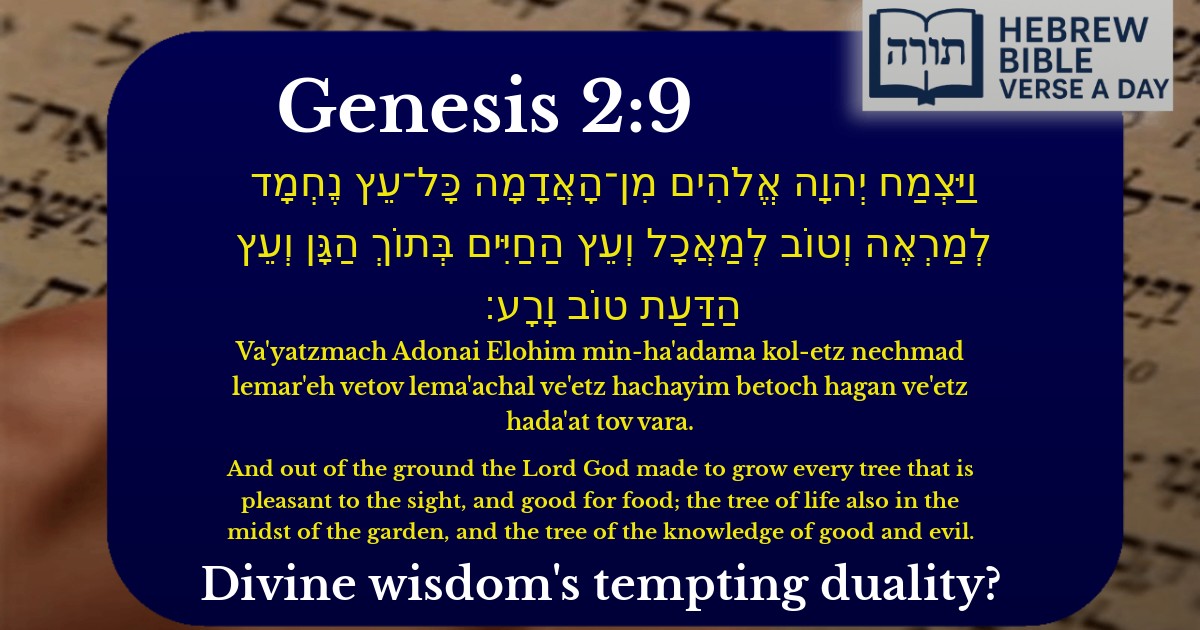Join Our Newsletter To Be Informed When New Videos Are Posted
Join the thousands of fellow Studends who rely on our videos to learn how to read the bible in Hebrew for free!
Hebrew Text
וַיַּצְמַח יְהוָה אֱלֹהִים מִן־הָאֲדָמָה כָּל־עֵץ נֶחְמָד לְמַרְאֶה וְטוֹב לְמַאֲכָל וְעֵץ הַחַיִּים בְּתוֹךְ הַגָּן וְעֵץ הַדַּעַת טוֹב וָרָע׃
English Translation
And out of the ground the Lord God made to grow every tree that is pleasant to the sight, and good for food; the tree of life also in the midst of the garden, and the tree of the knowledge of good and evil.
Transliteration
Va'yatzmach Adonai Elohim min-ha'adama kol-etz nechmad lemar'eh vetov lema'achal ve'etz hachayim betoch hagan ve'etz hada'at tov vara.
Hebrew Leining Text
וַיַּצְמַ֞ח יְהֹוָ֤ה אֱלֹהִים֙ מִן־הָ֣אֲדָמָ֔ה כׇּל־עֵ֛ץ נֶחְמָ֥ד לְמַרְאֶ֖ה וְט֣וֹב לְמַאֲכָ֑ל וְעֵ֤ץ הַֽחַיִּים֙ בְּת֣וֹךְ הַגָּ֔ן וְעֵ֕ץ הַדַּ֖עַת ט֥וֹב וָרָֽע׃


The Trees in Gan Eden
The verse describes how Hashem caused various trees to grow from the ground in Gan Eden. Rashi (Bereshit 2:9) explains that these trees were not merely functional but were aesthetically pleasing ("נֶחְמָד לְמַרְאֶה") to enhance the enjoyment of Gan Eden. This teaches that Hashem created beauty in the world for human benefit and appreciation.
The Tree of Life and the Tree of Knowledge
The verse mentions two special trees: the עֵץ הַחַיִּים (Tree of Life) and the עֵץ הַדַּעַת טוֹב וָרָע (Tree of Knowledge of Good and Evil). Ramban (Bereshit 2:9) suggests that the Tree of Life had the power to grant eternal life, while the Tree of Knowledge represented moral choice. The placement of the Tree of Life "בְּתוֹךְ הַגָּן" (in the midst of the garden) indicates its central importance.
Spiritual and Physical Sustenance
The phrase "טוֹב לְמַאֲכָל" (good for food) indicates that the trees provided physical nourishment, while the presence of the Tree of Life and the Tree of Knowledge provided spiritual and moral dimensions. The Kli Yakar (Bereshit 2:9) notes that this duality reflects the balance between physical and spiritual needs in human existence.